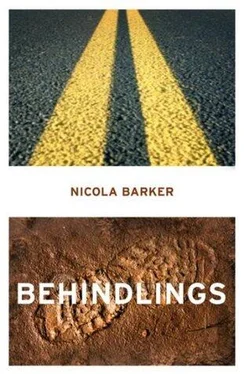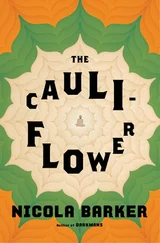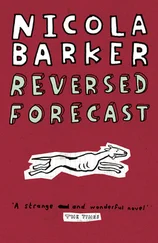‘Following’s got so complicated,’ the boy murmured to the sock, once he’d put the cup aside, ‘but you’re the champ at it, Doc. You’re the whizz. You’re the star. If you left us, Doc, it’d all fall apart. Because you’re the champ, Doc. You’re the killer.’
As if words alone could not convey the violence of his emotions, the boy began twisting Doc’s white-cotton-clad toe, at first softly, then with an ever-greater voracity.
‘I love you, man. You’re the bloody-fucking-whizz. That’s for certain. I even love your dog, although it pissed on my boot when I first joined up and everybody laughed at me. And that wasn’t actually very funny. I didn’t like it. And you didn’t like me either, back then, Doc. But I think we’ve grown to mutually respect each other. But you’re still the champ, man. You’re still solid, man. Rock solid, man.’
Doc sat bolt upright.
‘ Ow! ’
The boy sprang back.
‘You’re alive again,’ he whispered, plainly awed.
‘What are you doing to my bloody foot?’ Doc asked crossly.
‘Nothing.’
‘Then what have you done with my bloody shoe?’ Doc asked, crosser still.
‘Nothing. It must’ve fell off.’
‘A likely story,’ Doc harrumphed.
‘I thought you was dead,’ the boy muttered.
‘You thought I was dead so you stole my damn shoe?’ The Old Man felt around inside his pockets, ‘What else did you try and nick, you little monster?’
Doc pulled himself stiffly from the trolley. ‘Not dead yet, boy,’ he mumbled darkly, starting to walk, gingerly, ‘still too much to do.’
‘Your dog’s outside,’ the boy followed him through the ward, ‘he was tied up at the Turpin house, so I brought him over. Just in case you…’
Doc turned and looked down at the boy. ‘What’re you waiting for?’ he asked gruffly. ‘You’ve had your moment, now sod off. ’
On his way out, the boy dumped his half-full paper cup onto the desk at the nurse’s station. ‘I hate fucking tea,’ he yelled, then nudged it and tipped it up and ran out laughing.
When the back of the pick-up was fully loaded and the tarpaulin was pulled over to protect its contents, Dewi opened the bonnet and inspected the engine. He checked the water, the oil. The oil was low. He carefully added some.
He was ready to go.
But first…
He’d seen Josephine Bean leaving at full tilt on Katherine’s bike. He’d heard a certain amount of commotion. But he refused to… he couldn’t…
He sniffed and pulled up the collar on his coat.
The sleet was setting in; there’d been a slight change in wind direction. He glanced over towards the smashed bungalow window. He frowned. He scratched his head. He turned and disappeared inside his own bungalow. He re-emerged, minutes later, holding some strips of polythene and some masking tape. He crossed the road. He began to hold up the polythene to the window frame…
He scowled.
He returned to his van, pulled back the tarpaulin, located his tool box, removed a small hammer, a chisel, a little hand-brush…
He climbed in through Katherine’s window. Katherine was sitting on the sofa, wrapped up in a duvet, quietly watching him. He gave her a blank look, as if all remaining traces of affection had been scoured out of his eyes, his brain, turned, and gently began tapping out the worst of the glass.
But he was a perfectionist. Soon he was tapping out all of it, even chiselling out the bits inside the frame. When it was clean, he climbed outside again. He began sticking the plastic up; it didn’t take him long.
Then he was ready to go.
But first he went and found a broom and began sweeping up the exterior glass. He went and grabbed an empty, heavy brown-paper potato bag –
Bonzel Potatoes; Desiree 10lbs — and poured the glass remnants inside it. Folded the top over. Once. Twice. Sealed it with tape. Put it next to the gatepost for the bin-men to collect.
Now he was ready to go.
The hydrangea was still on the pavement, though. He went over and fetched it. He inspected it for root damage (extensive, no matter what the Bean girl’d said). He went into his back garage and found some compost, a fork, a watering can. He carried them over to the bungalow. He turned the soil over, fertilised, replanted the hydrangea, watered it.
Now he was ready to go.
First he needed to wash his hands, though. He went back to his bungalow and washed his hands. Dried them. Strolled out onto his verandah. Noticed that the hydrangea was tilting in the wind — to the left. Went and found a stake in his back garage and some rope. Staked the hydrangea up and tied it into place. That was better.
Yup.
He dusted himself off.
Now he was ready to go. He put the keys to his house into a brown envelope and pushed the envelope under the doormat. He straightened up and looked around him for the final time. The last, the very last time. He walked down his steps, along his path, through his gate (which clicked shut behind him then opened again. He turned and clicked it properly shut). He climbed into his van. He put on his seat belt. He adjusted his rear-view-mirror. He pushed his keys into the ignition. He fired the engine. He waited for three minutes exactly. Then he drove off.
He was gone.
‘It’s your fault.’
Wesley was standing on the bank, dripping wet. He was pointing at Eileen who was holding onto Sasha for support. Clutching at her. Or perhaps it was the other way around. He couldn’t tell. He didn’t care.
He was angry. He was cold. He was alive.
Eileen was shaking. The box of eggs lay open on the floor.
‘Pardon?’ the little girl said, her eyes moving religiously from his face to his hand, his face to his hand.
He tried not to look back at her. When he looked at her he felt an uncontrollable urge to slap her face, then his own. So he tried not to look.
‘You sank my father’s boat,’ Wesley snarled (ignoring the girl’s intervention), ‘and that was all I had left of him.’ Eileen was terrified.
‘It was only…’ she kept saying, making a pathetic throwing movement with her hand, ‘just a tiny…’
‘He’s being ridiculous, ’ the girl murmured, ‘ ignore him.’
Wesley took a furious step forward, lifted his bad hand and slapped his own face.
Clap
Arthur turned, from the bank, to apprehend this act. It was the first time they’d made eye contact since they’d been on dry land. Arthur watched him, half-smiling. There was almost… almost pity in it. Wesley saw the smile, recognised its meaning, felt a surge of rage rise within him. ‘I should’ve left that damn canister,’ he spat. He immediately regretted it. So much so that he held his breath –
A stillness
Arthur frowned. The deer made a grunting sound. He turned back towards the water. Sasha gave a low cry and moved towards the bank. Eileen remained where she was.
Wesley began breathing again. He shuddered. He saw his knife in her hand.
‘That’s my knife,’ he murmured childishly, ‘ give it back.’
She held it out to him, terrified, handle first. He snatched it from her, picked up the vixen, slung her around his shoulders, then pointed with the knife to the eggs, which were still on the floor where she’d left them. ‘There are two cubs,’ he said, ‘in a den under the flyover. This was their mother. A car killed her. The eggs are for them.’
He began walking.
‘What about the deer?’ The girl turned from the bank. ‘What about Brion? He…’ Wesley blanked her out. Walked on.
Once he reached the flyover he clambered up onto the road and headed along it. Away from Canvey. The first dwelling he came to, he knocked at the door and asked for some dry clothing. The oldest son in the house obliged him, gave him a mug of coffee, a piece of toast. He brought out a spade and they buried the vixen together, under an old cobnut tree at the far end of the garden; Cooper — a grey-muzzled brown labrador — officiated, accompanied by a tunelessly raucous starling choir.
Читать дальше
Конец ознакомительного отрывка
Купить книгу












